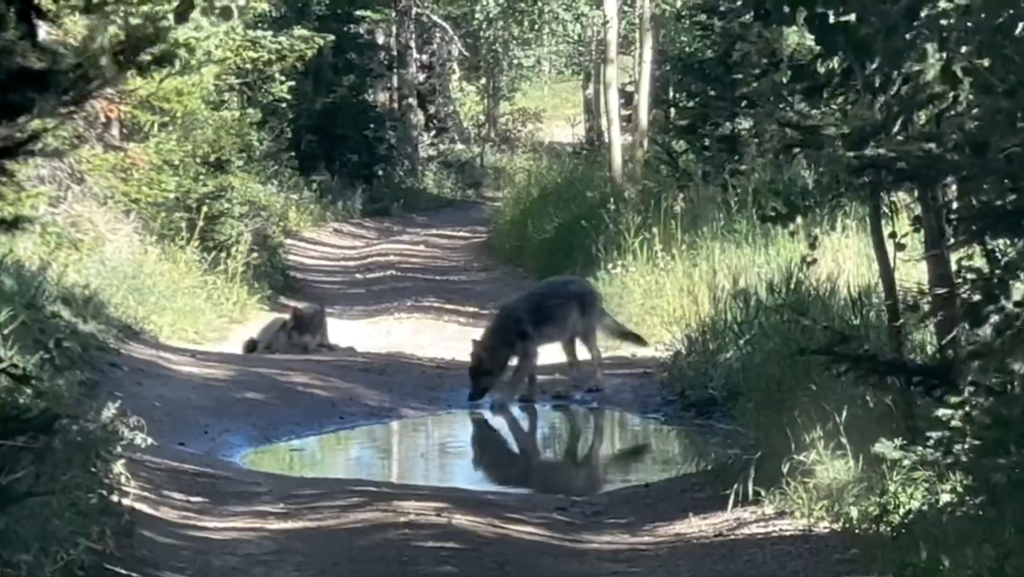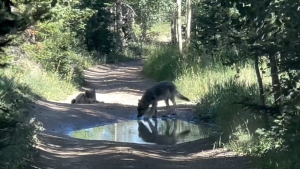Colorado Parks and Wildlife halts search for depredating Copper Creek wolf as more livestock attacks are confirmed in Rio Blanco
Why three Jackson County attacks in 30 days will not be considered chronic depredation

Mike Usalavage/Courtesy video
After months of reported wolf activity and seven confirmed wolf attacks on livestock in Pitkin County, Colorado Parks and Wildlife has not verified any depredations in the county since mid-August, causing the agency to change course on attempts to euthanize a responsible Copper Creek wolf.
However, as the activity slows in Pitkin County, the agency has confirmed two attacks in Rio Blanco this October following its removal operations in August, which ended in a wolf being shot but never recovered.
The decision to euthanize a chronically depredating wolf — defined as three or more depredation events in 30 days — is guided by Parks and Wildlife’s chronic depredation management directive. If the definition is met, impacted producers have utilized appropriate nonlethal deterrence methods, and lethal removal is likely to change pack behavior, the agency can kill the responsible animal or animals.
The directive also recommends an incremental approach, where, after killing one pack member, the agency enters an evaluation period to determine whether the pack’s behavior shifts away from predating on livestock. If it does not, the agency can remove more members of the pack.
Copper Creek Pack in Pitkin County
After searching since June, Parks and Wildlife is no longer attempting to kill a second Copper Creek wolf responsible for livestock attacks in Pitkin County, according to Travis Duncan, a public information officer for the agency.
The Copper Creek Pack’s matriarch and four yearlings were released in Pitkin County in January, following nearly five months spent in captivity after they were tied to repeated livestock attacks in Grand County.
Following their release, several wolves in the pack were connected to four attacks in the Capitol Creek Valley between May 17 and May 2, meeting Parks and Wildlife’s definition for chronic depredation.
The wildlife agency killed one of the pack’s yearlings in an attempt to curb the pack’s predation on livestock — and toward native ungulate populations — in the area.
The Copper Creek Pack was Colorado’s first pack established by reintroduced wolves. It formed in the spring of 2024 after two Oregon wolves mated and had five pups.
June 18, 2024: First pup born to reintroduced wolves confirmed. Family named Copper Creek Pack.
April to July 2024: Pack involved in repeated livestock depredations in Grand County.
Aug. 19: Video confirmed more pups in the pack.
Aug. 30 to Sept. 25, 2024: 6 members of the pack (2 adults and 4 pups) are captured and relocated to a wildlife sanctuary due to depredation activity.
Sept. 3, 2024: Pack’s adult male died due to a gunshot wound.
Sept. 30 to Oct. 11, 2024: 5th wolf pup from the pack identified in Grand County; remains in wild after failed capture attempts.
Jan. 2025: Adult female and four pups released back into the wild in Pitkin County.
May 17-25, 2025: Pack connected to four livestock attacks in eight days in Piktin County, meeting “chronic depredation” standard set by Parks and Wildlife.
May 29, 2025: Male yearling killed by Parks and Wildlife.
July 18, 2025: Copper Creek wolf pack responsible for seventh livestock attack in Pitkin County
July 28, 2025: CPW confirms they are seeking to kill a member of the Copper Creek pack
However, the behavior continued after the yearling’s death — with an additional attack confirmed on July 18 — which prompted the agency to try and euthanize a second member of the pack.
Parks and Wildlife began its search for the second pack member on July 20, reporting that it would only remove a wolf that it was confident was involved in the attacks.
While the search was ongoing, the state agency confirmed additional wolf attacks on livestock in Pitkin County on Aug. 7 and Aug. 12. It has not confirmed any in the county since then.
While the agency has stopped its search as of October, “we continue to evaluate the pack’s behavior,” Duncan said.
Previous reports from the agency indicated that its inability to locate the collared animal was due to challenging topography and terrain.
Additional Rio Blanco depredations by unknown, uncollared wolf
Parks and Wildlife also attempted to kill another chronically depredating wolf in Rio Blanco this summer. The uncollared wolf was connected to three livestock attacks in the county between July 20 and Aug. 2.
The agency, alongside partners with the U.S. Department of Agriculture’s Wildlife Services, located the wolf responsible in mid-August and shot the animal. While the agencies found evidence that the wolf had been hit, it was unable to locate the animal, dead or alive.
The DNA collected from the scene identified the wolf as the fifth Copper Creek Pack yearling. This wolf evaded capture when the pack’s other members were caught and relocated to a sanctuary.
After ending the operations and search for the wolf in August, Parks and Wildlife has since confirmed two livestock attacks — each involving a single ewe — in Rio Blanco County on Oct. 9 and Oct. 12.
Duncan said Monday that the agency believes “these depredations are connected to an uncollared wolf based on an unconfirmed visual sighting of an uncollared canid and unconfirmed reports of a howl the night of Oct. 9 as well as a lack of GPS collar data in the area.”
The wildlife agency has no way of confirming whether it’s the same uncollared Copper Creek yearling that was shot in August.
“The only way to do this is with a biological sample,” Duncan said.
Three attacks in Jackson County fail to meet chronic depredation standard
In August, Parks and Wildlife also confirmed three wolf attacks on livestock within 30 days in Jackson County. According to the agency, the depredations occurred on Aug. 21, Aug. 29 and Sept. 4, and involved four yearling calves.
To confirm an event as a wolf depredation, Parks and Wildlife must determine that a wolf was more likely than not responsible for the death or injury of the calves. However, none of the three events in Jackson County had enough evidence to say without a doubt that a wolf was involved, which is what Parks and Wildlife requires for it to be considered a chronic depredation situation.
“Although there were three depredations in the area within a 30-day period, none of the incidents met the definition of ‘clear and convincing’ needed for a chronic depredation determination,” Duncan said.
To meet Parks and Wildlife’s definition of “chronic depredation,” at least one of the three livestock attacks has to have “clear and convincing evidence,” which the agency defines as evidence of a wolf attack that “leaves no room for serious doubt that a wolf or wolves caused physical trauma resulting in injury or death to livestock or working dogs.”

Support Local Journalism

Support Local Journalism
As a Summit Daily News reader, you make our work possible.
Summit Daily is embarking on a multiyear project to digitize its archives going back to 1989 and make them available to the public in partnership with the Colorado Historic Newspapers Collection. The full project is expected to cost about $165,000. All donations made in 2023 will go directly toward this project.
Every contribution, no matter the size, will make a difference.










